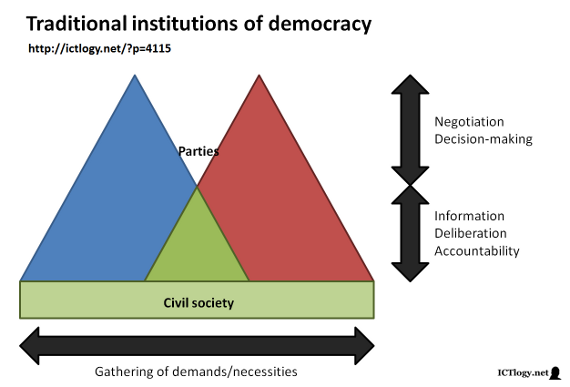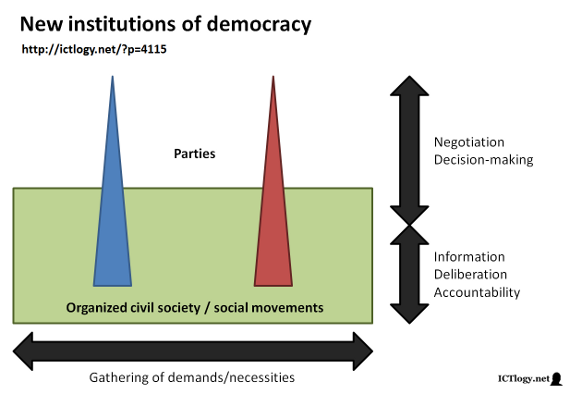The following paragraphs do not intend to present an idea particularly new, although I think it is pertinent to say that they seek to revisit an old idea under a new context.
On the other hand, this is more an intellectual exercise — or even a speculation — rather than an academic proposition. However, it is fair to acknowledge that this exercise does not appear out of the blue. On the contrary, it is firmly based on two recently published works and the respective bibliographies that support them:
- Casual Politics: From slacktivism to emergent movements and pattern recognition (bibliography).
- Spanish Indignados and the evolution of 15M: towards networked para-institutions (bibliography).
Finally, although this discussion has been cooking in the oven for the last few months, I can not leave unsaid that Daniel Innerarity’s latest op-ed — ¿El final de los partidos? [The end of parties?] — has been the final trigger. The article — a highly recommended reading — goes on to state that although the world has changed, the institutions of democracy (governments, parliaments, political parties, unions, nonprofits, etc.) are still the best way we have to organize our lives in society. And that these institutions being reformed, but in essence those are the ones we have and the ones we should be keeping.
Institutions and democracy
Les us simplify as much as possible — with the consequent risk to fall into inaccuracies, generalizations and biases — what is a liberal democracy.
Since policy is no longer the management of the polis, citizenship has been alienated from the exercise of directly and personally ruling public affairs. This is no answer to no plan hatched in the dark to uptake power, but mainly responds to reasons of efficiency: the polis has become a county, a region, a state, a global world that requires full-time leaders, professionals that can manage the enormous complexity of politics and that, of course, serve all citizens and respond to them and their needs. No one can afford devoting themselves to managing public affairs and, at the same time, managing personal matters and earning their livelihoods. At least not without the slaves who had our Greek ancestors (some of our contemporary representatives actually have someone working for them, or just neglect public affairs, but this is another matter).
We have created, thus, institutions that represent us politically and work for everyone. At the lowest level of those institutions (e.g. political parties or labour unions) many citizens participate (joining, sympathizing, collaborating) to gather information on the needs and demands of their peer citizens, as well as deliberating on the various possible solutions.
At another level, a few representatives (governments, parliaments) are responsible for making decisions, after having negotiated the wills of the various groups represented. At the end of the cycle, this level ensures accountability of the decisions made before the lower level.
The general population, given the difficulty of being informed and engaged, remains outside the whole process and only follows it remotely through the press, political propaganda and punctual moments of participation through the ballot box.
Crisis of institutions
There are at least four reasons why current political institutions have seen their legitimacy diminishing in the process of representative (or institutional) democracy:
- Because the professionalization of their boards has become not a means but an end in itself. Staying on the job happens to be the goal of many in office, getting out of line of what should be their genuine purpose: to serve the citizens they represent. This deviation or sheer abandonment of the original mission of the institutions, of course, has happened at the expense of the legitimacy and the gradual withdrawal of citizenship.
- This professionalization has crowded out from the foundations of the institutions those citizens who saw participation as a vocation of service and not as a professional vocation. This expulsion may have been active or reactive, but the results have been clear: thinning of the bases and withdrawal (again) of the bulk of the citizenry.
- The increasing complexity of politics, together with the professionalization and the brain drain of the institutions has resulted in the worst of situations: trivialization and playing down of the complex, simplifying the political message and its consequent radicalization of ideas. The political debate becomes meager, addressed to media, puerile, rather than strengthening deliberation and seeking learning in the democratic process. In the absence of political pedagogy, behold disaffection.
- Last but not least, many of the previously mentioned issues may not have a solution, but they could in deed have a strong contribution thanks to the new Information and Communication Technologies (information and communication: how often we forget the meaning of the acronym ICT). There are many things that ICT could help on: encourage participation and engagement of talent, transparency and accountability, dialogue and debate. If they are not a magic solution, their negation itself is a clear statement of principles: although the use of ICTs may have great potential in all areas of politics, we have no intention of putting them into practice and realize this potential. More disaffection, especially from the ones who could and would participate.
Consequences?
On the one hand, the thinning of the bases of the institutions, especially those closest to the citizenry (parties, unions). On the other hand, the shift of information and accountability “upwards”: the same ones that negotiate and make decisions are the same ones that are informed about what is “necessary” or “convenient” being done, and are also the same ones that are accountable amongst themselves.
The result is a growing disconnect with the society due to the shrinking of the social bases and the lack of in-depth, “vertical”, technical and political paths of the implemented policies. Deliberation is not only absent but even avoided. Without information, citizens can not deliberate. Indeed, without being “professionalized”, the citizenry becomes a hindrance to decision making. Everything for the people.
Social movements
Kicked out by institutions, empowered by digital technologies and spurred by the crises (increasingly less cyclical and increasingly more structural, given the speed of change in the new Information Society) citizens organize themselves. Oblivious to the institutions. Even despite institutions.
They organize, and it is worth emphasizing it, the do it in a horizontal way, away from the verticalities of the party hierarchies. And they do it horizontally for two main reasons:
- Because this is the architecture that the new technology — the great enabler of new organizations — promotes above all. One person, one node. While there actually are leaders, they are leaders to the extent that they contribute to the cause, not to the extent of them thriving within and up the organization. And they are leaders while they are facilitators, not fosterers: facilitating the work of the entire network, not just staging their own personal and individual projects.
- Because the new binders are the projects, not big enterprises. While it is true that, by aggregation, projects can generate programs and programs can generate these strategies, in the new movements what is important is trees, not the forest, fishes, not the bank. The initial goal is to save my home, not to change the housing law, while larger institutions begin to change the law and, if given the circumstances, save a handful of homes. And that’s what it means “bottom-up”: not only where the action starts, but the fact that the overall process is reversed.
The problem, as can well be seen in the example above, is that the translation from horizontal to vertical is very complicated. And the shift from project to strategy, from local to global, from what is personal to what is public does require a certain verticality.
It is at this point where I personally agree with those defending tooth and nail the existence of institutions. And it is certainly a crucial point that separates me/us from those who opt for the elimination of the institutions or their reduction to a minimum — and this includes assembly-based movements and anarchists, but also, and it should not be forgotten, extreme liberalism (extremes always meet).
But that we need institutions does not mean that (a) they necessarily have to be the ones we already have, or that (b) even if we keep the ones we have, their design should be the same one they now have. Or, put another way, there is much room for debate between maintaining the status quo — the democratic institutions should be the same ones we already have — and demolishing any semblance of institutionality — direct and/or assembly-based democracy.
In a world of shadows of grey, away from black or white, there surely is room for a possible hybridization of organized citizens and traditional institutions. This reflection began by saying that the idea was not new, but the context was. It is possible that the great institutions of the past must now split into different institutions, some older ones (parties, unions) who will come to live with some newer ones (or not so new, but refurbished in their inner organization: platforms, movements). I believe that many of the functions taking place inside the classical institutions may end up taking place outside of them and within new institutions. Efficiently and effectively conveyed by technology, without barriers of time and space, it seems possible and even desirable to me to return the information back to the base, to the new institutions of the civil society that will extend the length and breadth of the citizenry and citizenship. Moreover, if there is a place where deliberation — an informed deliberation — can happen, where better than out under the daylight, among peers, with total openness and transparency. Ditto for accountability.
For the rest, to link the global with the local, the collective and the personal, to “verticalize” the demands into decision-making, traditional institutions surely will continue to have an important role… although with severe transformations: like learning how to listen, how to network. They will arguably be much more flexible, probably smaller; relegating power, shifting representation and many other tasks towards the new social movements and civil society organizations. They will have to work together and, therefore, establish ways to collaborate, to mutually enrich themselves, to share the work.
In short, the grassroots levels of the parties should probably be “outsourced” and keep parties not as think tanks or policy-making industries (which largely have by now ceased to be) but facilitators and implementers of proposals. About leadership, the civil society will sooner or later take over.




 14.3 MB)
14.3 MB) 149.64 MB)
149.64 MB)